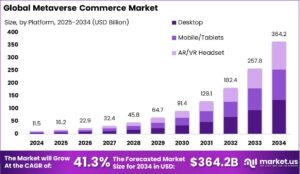The metaverse and building trust

Escaping the real world at the end of a working day and diving into an online one is nothing new.
Whether it is TikTok or Call of Duty that’s your guilty pleasure, the escapism that online apps and games provide can be unparalleled and provide the perfect opportunity to “switch off”.
While the pandemic meant our work lives were taken out of the office and made digital, it also had a direct correlation to the amount of time we spent online. A 2022 report found that global time spent online clocks in at 12½ trillion hours. It is inevitable then that we’ll see these numbers increasing by the creation of more and more immersive experiences.
Not “one metaverse to rule them all”
Scratch the surface and you’ll find every online company is scrambling to become a metaverse company, with Facebook’s parent company Meta the most prolific. However, while when it comes to some tech you are either in one camp (say Apple) or another (like Android), the lines are a lot more blurred when it comes to the metaverse.
Just like there isn’t a single online game, there won’t be one “metaverse” — online apps are all likely to run their own metaverses, allowing different games to continue to exist, and a myriad of different businesses are likely to build metaverses to solve the specific problems they are trying to solve. In this case, we are likely to see every user that is signed up for multiple metaverses be offered an incentive for these metaverses to be interoperable.
For instance, imagine you bought a pair of earrings, but you can only use them at work, and you need another set for every shop you go into. Similarly, if you’ve built an avatar for your work, you’ll want to use the same one on your LinkedIn profile, and probably the same again when you’re playing a game or going to the cinema with your friends. And for all of them, if you’ve bought a hat, you want that same hat in each of the metaverses you are a part of.
Buying a digital identity
A lot of things we have now in the physical world will exist in the metaverse — and the market is already proving to be wonderful but also, in some cases, a little weird. An article by Forbes reported on someone spending $450,000 in the metaverse so that they could have a “virtual property” next door to Snoop Dogg, while many smart people are confused at the emergence of a $40bn market for NFTs. More tangible — though still digital — is the growth in spending on in-app purchases, with many users spending thousands on digital T-shirts for their in-game characters.
If our online avatars become central to our identity, as we spend more time in a virtual world, the amount we are happy to spend on digital clothes and jewellery will only grow. Brands like Adidas, with its “into the metaverse” range, are likely to encourage selling physical clothes and the right to wear them inside the metaverse.
This might sound strange;why would people spend money on digital clothes? If you ever wore a shirt and shorts while on a Zoom call, you might begin to realise that many of our clothing choices are about what other people can see — and as they’ll see the digital version of yourself much more than the real you in the not-too-distant future, it’s important to look good.
Who owns my digital identity?
Can you remember the first time you bought something online? How sure were you that you were going to get the thing you paid for? Most online retailers have built trust with their customers over many years. If you buy something from a reputable brand, you can be pretty confident it’s going to arrive — and if not, you know that you can always request a refund or return.
Something similar happens when we buy digital goods. Digital app stores – like the Apple app store and Google Play – are huge businesses with a significant income coming from “in-app purchases”covering subscriptions to streaming and health apps, as well as people buying a new hat for their game character. At least part of this is down to the trust individuals have in Apple and Google — if my digital goods aren’t delivered, I know I’ll likely get a refund.
But if I now want to buy a digital hat that I can wear to my digital office on Microsoft’s Metaverse, my online dinner party on the Nando’s metaverse, and gaming on Roblox, where do I buy that hat? For the best price, and the most money for the investment in making the hat, you should buy it straight from your hat maker. How can I be sure, though, that if I give money to happy_hatmaker431 I’ll get my hat? And why would Microsoft, Roblox, and Nando’s care if I bought my hat from happy_hatmaker431 — what’s in it for them?
The blockchain hat dilemma
If you buy a hat from a hat maker, they can create an NFT (a way of proving that you own something by storing it on a blockchain). As a result, there can be only one owner of that unique item, you.
This smart contract can be used to transfer ownership from one person to another without any need for the two people to trust each other, and with no single trusted party acting as an intermediary.
If I buy my hat with a smart contract, I own it and can prove that by pointing to it on the blockchain. In this case, we remove trust, as a smart contract is guaranteed to do what it says it’s going to do, and once the blockchain confirms I own the hat, the record of transfer is immutable (it cannot be changed) — I can always point to that bit of the blockchain that proves I bought the hat.
That just leaves one problem left — why would Microsoft, Roblox, and Nando’s respect my ownership? Put simply, they know that I am more likely to play a game where I can use my hat — thus creating an incentive for game makers to respect my ownership.
Another option is instead of “owning” a digital item, you rent it. A different smart contract can be set up between the good makers and each of those platforms — such that a percentage of digital goods go to the platform that you’re using them in.
A world of trust still to explore
Whilst there are many ways that goods will pass from person to person in an increasingly online world, cryptocurrency, blockchain and smart contracts are serious candidates. That said, there are several challenges with trust to explore in the metaverse.
Buying and selling goods is just the start; we also need to consider the privacy considerations that may emerge. This includes new cyber attacks — like physical attacks, delivered virtually on people with wearables — and the disincentive of security in a space where speed and agility are likely to pick the winners.
But whilst it’s easy to get caught up in the “crypto hype” and just as easy to dismiss everything about blockchain, there are huge challenges and opportunities as we build a digital world, to make trust a central part of the way that buying and selling is done in the metaverse.
About the Author
Source link
#metaverse #building #trust





